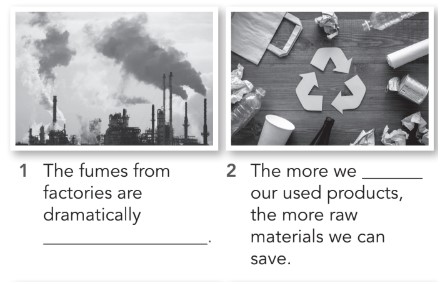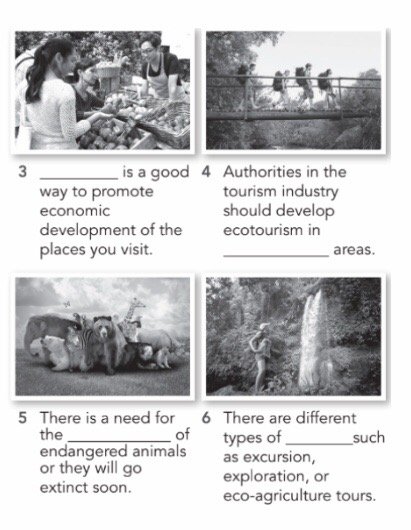8.1 Vocabulary - Unit 8. Ecotourism - SBT Tiếng Anh 10 English Discovery1. Look at the pictures and complete the sentences with the correct form of the words / phrases from the list.2. Choose the correct word to complete the sentences. 3. Use the following words to complete the leaflets: conserve, environment, communities, limit, reuse, save.4. List 5 activities that students should do to protect the environment.
Lựa chọn câu để xem lời giải nhanh hơn
Bài 1 1. Look at the pictures and complete the sentences with the correct form of the words / phrases from the list. (Nhìn tranh và hoàn thành câu với dạng đúng của các từ / cụm từ trong danh sách.) harm the environment remote ecotourism conservation buy local products recycle
Phương pháp giải: harm the environment: làm hại môi trường remote (adj): xa xôi, hẻo lánh ecotourism (n): du lịch sinh thái conservation (n): sự bảo tồn buy local products: mua sản phẩm địa phương recycle (v): tái chế Lời giải chi tiết:
1. The fumes from factories are dramatically harm the environment . (Khói từ các nhà máy gây hại nghiêm trọng đến môi trường.) 2. The more we recycle our used products, the more raw materials we can save. (Chúng ta càng tái chế nhiều sản phẩm đã qua sử dụng, chúng ta càng tiết kiệm được nhiều nguyên liệu thô.) 3. Buying local products is a good way to promote economic development of the places you visit. (Mua các sản phẩm địa phương là một cách tốt để thúc đẩy sự phát triển kinh tế của những nơi bạn đến thăm.) 4. Authorities in the tourism industry should develop ecotourism in remote areas. (Các cơ quan có thẩm quyền trong ngành du lịch nên phát triển du lịch sinh thái ở các vùng sâu, vùng xa.) 5. There is a need for the conservation of endangered animals or they will go extinct soon. (Cần bảo tồn các loài động vật có nguy cơ tuyệt chủng nếu không chúng sẽ sớm bị tuyệt chủng.) 6. There are different types of ecotourism such as excursion, exploration, or eco-agriculture tours. (Có các loại hình du lịch sinh thái như du ngoạn, khám phá, du lịch sinh thái nông nghiệp.) Bài 2 2. Choose the correct word to complete the sentences. (Chọn từ đúng để hoàn thành câu.) 1. Recycling glass paper, plastic, and metal products helps to conserve / harm the environment. 2. Sustainable tourism development should satisfy the demands of local communities / products. 3. Annually, thousands of tourists / tourism visit this area which then causes numerous environmental problems. 4. The giant piles of garbage are the alarming bells that we need to limit our waste / energy use. 5. The government should ensure that tourism development is in harmony with the environment / conservation. Lời giải chi tiết:
1. Recycling glass paper, plastic, and metal products helps to conserve the environment. (Tái chế giấy thủy tinh, nhựa và các sản phẩm kim loại giúp bảo tồn môi trường.) Giải thích: - conserve (v): bảo tồn - harm (v): làm hại 2. Sustainable tourism development should satisfy the demands of local communities. (Phát triển du lịch bền vững cần đáp ứng nhu cầu của cộng đồng địa phương.) Giải thích: - communities(n): cộng đồng - products (n): sản phẩm 3. Annually, thousands of tourists visit this area which then causes numerous environmental problems. (Hàng năm, hàng ngàn khách du lịch đến thăm khu vực này, sau đó gây ra nhiều vấn đề về môi trường.) Giải thích: - tourists (n): khách du lịch - tourism (n): du lịch 4. The giant piles of garbage are the alarming bells that we need to limit our waste use. (Những đống rác khổng lồ chính là hồi chuông cảnh báo chúng ta cần hạn chế sử dụng rác thải.) Giải thích: - waste (n): rác thải - energy (n): năng lượng 5. The government should ensure that tourism development is in harmony with the environment. (Chính phủ cần đảm bảo rằng sự phát triển du lịch phải hài hòa với môi trường.) Giải thích: - environment (n): môi trường - conservation (n): sự bảo tồn Bài 3 3. Use the following words to complete the leaflets: conserve, environment, communities, limit, reuse, save. (Sử dụng các từ sau để hoàn thành tờ rơi: bảo tồn, môi trường, cộng đồng, hạn chế, tái sử dụng, tiết kiệm.) WORLD WATER DAY This is a day you can't miss to (1) _______ the (2) _______. If you still have enough water to use every day, you are so lucky because more than 2 billion people are living without access to fresh water. To raise public awareness about this issue, the World Water day was invented on 22 March 1993 and has been celebrated annually since then. We could (3) ___________ the amount of water used or (4) __________ the water for other purposes. Please come and join us to (5) ________ water and urge the (6) ________ to do the same. Lời giải chi tiết:
WORLD WATER DAY This is a day you can't miss to (1) conserve the (2) environment. If you still have enough water to use every day, you are so lucky because more than 2 billion people are living without access to fresh water. To raise public awareness about this issue, the World Water day was invented on 22 March 1993 and has been celebrated annually since then. We could (3) limit the amount of water used or (4) reuse the water for other purposes. Please come and join us to (5) save water and urge the (6) communities to do the same. Tạm dịch: NGÀY NƯỚC THẾ GIỚI Đây là một ngày bạn không thể bỏ lỡ để (1) bảo tồn (2) môi trường. Nếu bạn vẫn có đủ nước để sử dụng hàng ngày thì bạn thật may mắn vì hơn 2 tỷ người đang phải sống mà không được sử dụng nước ngọt. Để nâng cao nhận thức của cộng đồng về vấn đề này, ngày Nước thế giới đã được phát minh vào ngày 22 tháng 3 năm 1993 và đã được tổ chức hàng năm kể từ đó. Chúng ta có thể (3) hạn chế lượng nước sử dụng hoặc (4) tái sử dụng nước cho các mục đích khác. Hãy đến và tham gia với chúng tôi để (5) tiết kiệm nước và kêu gọi (6) cộng đồng cũng làm như vậy. Bài 4 4. List 5 activities that students should do to protect the environment. (Nêu 5 hoạt động học sinh nên làm để bảo vệ môi trường.) Students should _____________ Lời giải chi tiết: Students should save electricity, reduce paper consumption, walk to school or take a bike, avoid taking cars or carpool when possible, swap regular school supplies, and stop littering. Tạm dịch: Học sinh nên tiết kiệm điện, giảm tiêu thụ giấy, đi bộ đến trường hoặc đi xe đạp, tránh đi ô tô hoặc đi chung xe khi có thể, trao đổi đồ dùng học tập thông thường và ngừng xả rác.
|















